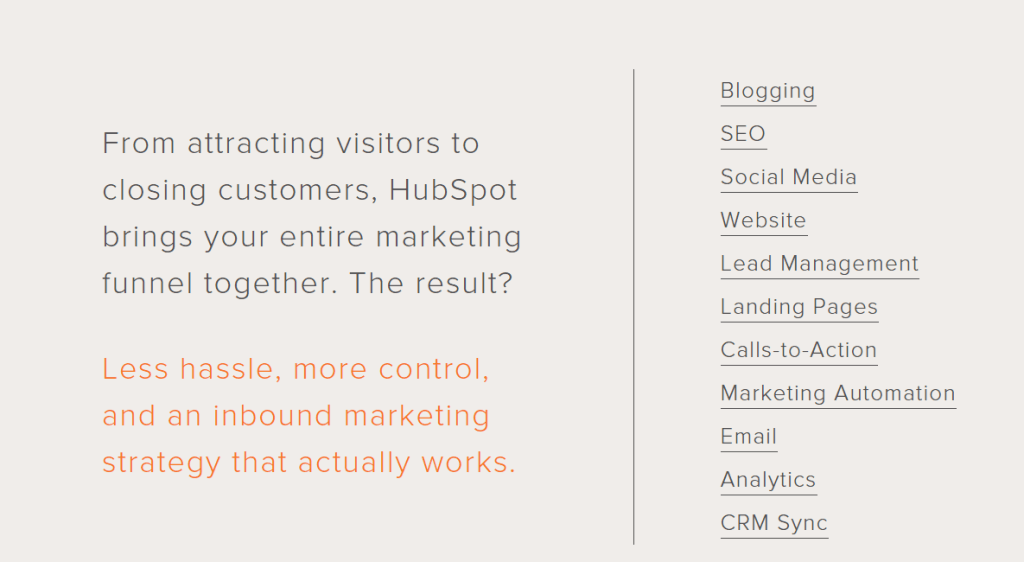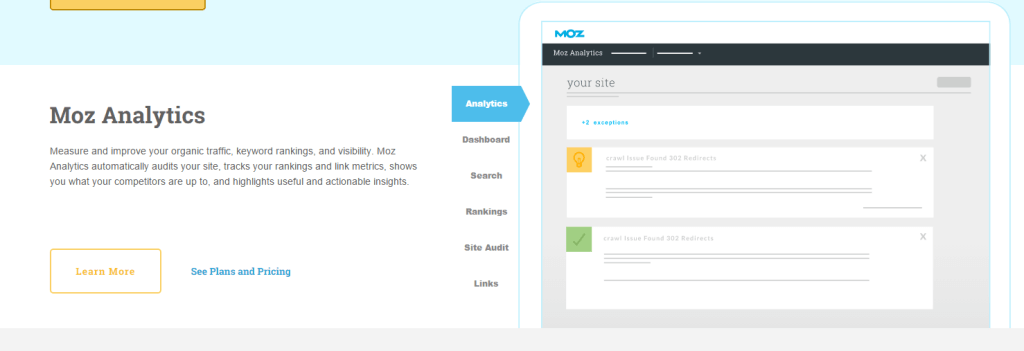Looking for a new digital agency to help grow your business? Schedule a free marketing evaluation with our team to meet the right agencies fast. It’s fast, free, and we get it right.
Many marketers and businesses have asked the question “Which should I use, Moz or HubSpot?” While the answer is often “Why not both?” because they are vastly different tools (and the founders are very good friends), we thought it would be useful to dig into the differences to help you make the right decision for your business.
At a very high level, HubSpot is more advisable for businesses with more capital as this product is more expensive in terms of initial and ongoing pricing. It is, however, packed with more features and covers more marketing channels.
Moz’s software, on the other hand, can be considered competitive in terms of design and pricing, but lacks aspects like project management and the automation possible with Hubspot.
Hubspot is a marketing platform, whereas Moz is a strong reporting and tools suite to help marketers and businesses gather their own information.
Table of Contents
Price Comparison
Moz distinguishes its pricing scale using four tiers: Standard, Medium, Large and Premium. Moz Pro’s Premium offering is comparable with HubSpot’s Pro Offering. At $599 per month (and $1437 savings if purchasing a year’s contract), Moz provides 100 Moz Analytics Campaigns, 7,500 keywords, 1.25 million crawled pages, branded reports, 150 social media accounts and unlimited user accounts. Here is Moz’s pricing page.
On the other hand, HubSpot has the categories Basic, Pro, and Enterprise. HubSpot rates Pro at $800 per month (annual billing) with a one-time fee of $3000. The bundle includes 1000 included contacts, unlimited site visits and 4 subdomains. Here is Hubspot’s pricing page.
| Entry Level (Basic/Standard) | Middle Level (Pro/Medium) | High Level (Enterprise) | Premium | |
| Hubspot | 200 (plus $600 setup) | $800 (plus $3000 setup) | $2400 (plus $5000 setup) | n/a |
| Moz | $99 | $149 | $249 | $599 |
Product Features
HubSpot offers an array of features including social media publishing and monitoring, search keywords and links optimization, creation and monitoring of calls-to-action, email marketing, and marketing automation. The Pro package is already robust with most of the features and changing to enterprise will include more capabilities in analytics and market automation. If you are looking for a full fledged marketing suite to manage campaigns and reporting on those campaigns, Hubspot is a great fit.

Moz delivers its own set own set of features including Open Site Explorer, which helps in researches on competitor backlinks, views on social media activity, and analysis of anchor texts. Fresh Web Explorer caters monitoring and brand mentions for the product and its competitors. The Keyword Difficulty & SERP Analysis feature tackles problems in ranking for a specific term or phrase and the competitors for this keywords. And of course, Moz Analytics crawls your site weekly, reports on crawl issues, keyword rankings, and more. Moz is still more SEO focused than Hubspot and provides you the data to make decisions.

Reporting / Analytics
HubSpot offers analytics interfaces which lets users track goals and campaigns as well as persona-based reports. Competitor data will also be gauged relevant to the marketing metrics used by your business. The Enterprise plan also offers revenue and contact reporting, as well company-segmented reports.
Moz, on the other hand, offers a reporting dashboard with detailed information on site traffic, inbound channel performance, rank checking, links management and analysis, and onsite optimization. It’s easy to give the Moz report to your digital marketing boss, but it might not be the right metrics for your VP.
Coverage of Inbound Marketing Channels and Reporting
HubSpot covers a broader set of marketing channels including social media, blogs, email marketing, and integrated forms. Reporting also includes page analytics on site performance in terms of traffic, optimization, social media, and conversions.
Moz mainly focuses on search engine optimization and tracking, social activity data analysis, and recommendations for trending topics and content. Moz offers customizable reporting via its Moz API.
Who Should Use Which Tool?
At the end of the day, Hubspot is probably better suited towards inhouse marketers while Moz is better suited towards small to medium businesses and agency marketers.
Moz’s tools enable marketers to pull the data that they need and keep an automated report running weekly to flag up immediate issues, whereas Hubspot allows marketers to track full campaigns and month on month data while also providing a CRM.
Hubspot and Moz are both great suites of tools and deserve a look for your marketing needs!

